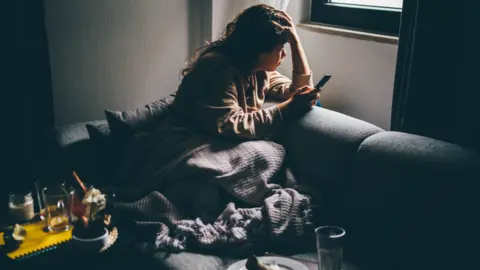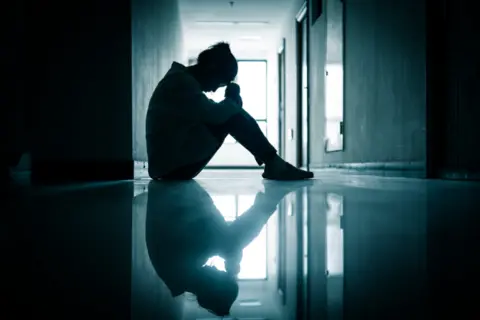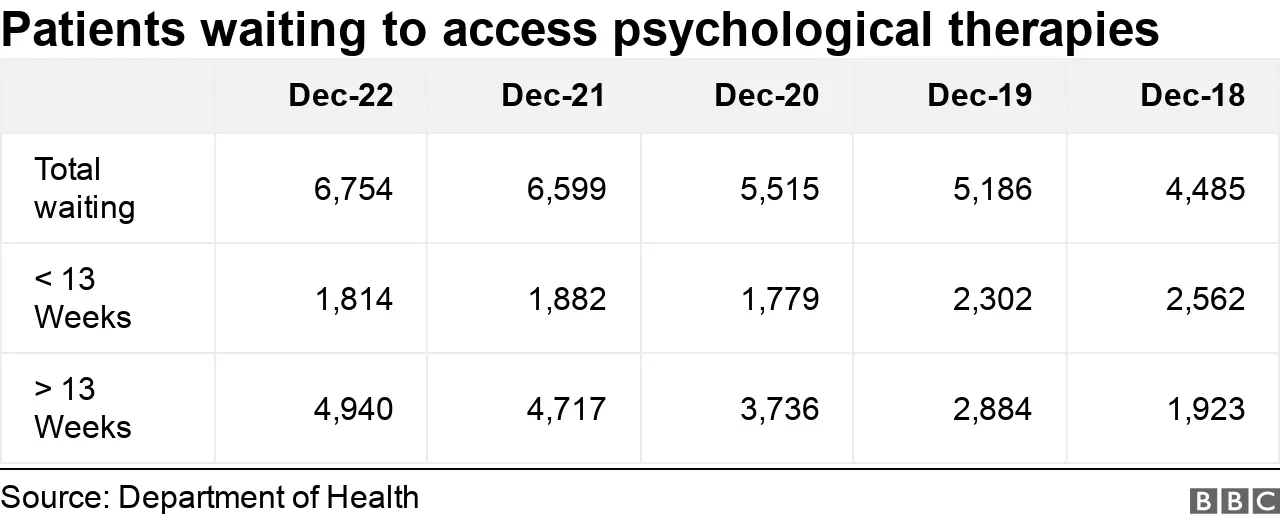Mental health services 'struggling' as waiting lists grow
 Getty Images
Getty ImagesHealth providers are struggling to meet the demand of people in significant immediate distress, Northern Ireland's mental health champion has said.
The number of people on mental health waiting lists for more than nine weeks has grown significantly since 2018.
Prof Siobhan O'Neill said "more psychologists, more psychiatrists" were needed.
She added "difficult decisions" lay ahead regarding Northern Ireland's 10-year mental health strategy.
Speaking to BBC NI's Good Morning Ulster, she revealed service providers had told her they regularly do not have the staff or adequate resources to provide efficient care.
"They are really, really struggling to cope with the demand and the increase in referrals of people who are in significant distress right now," she said.
"The facilities they have aren't adequate either. So this requires a reform of the whole system."
Growing waiting times
Waiting lists for mental health services in Northern Ireland have increased over the past four years, according to information provided by the Department of Health.
The number of young people waiting more than nine weeks for access to the Child and Adolescent Mental Health Service (CAMHS) more than tripled from 364 in December 2018 to 1,269 in December 2022.
There were 2,394 patients waiting more than nine weeks for access to adult mental health services in December 2022, compared to 1,579 back in December 2018.
Prof O'Neill said: "There are so many examples of people who have benefited from the services that are there but unfortunately the waiting lists are worrying.
"We need to make sure that the people who are on waiting lists get treatment and help as soon as possible - and the right sort of help so that they're not being passed around from pillar to post."

Annie's Story
Mother-of-two Annie said mental health is not taken as seriously as it should be, and watching her children suffer has affected her mental health as well.
Her daughter was admitted to hospital after a breakdown.
"Despite me pleading with them not to release her, they let her out," she said.
 Getty Images
Getty ImagesHer son and daughter have both spent some time on waiting lists for services after suicide attempts.
She said those waiting lists were "as big a killer - probably bigger - than most diseases".
"By the time you actually wait and get services, the problem is that once they have opened up and told of all this trauma, the next thing they go and there's maybe a new counsellor there," she added.
"They're having to retell and relive and retell and it's horrendous for them.
"It's as much use as an ashtray on a motorbike."

Department of Health (DoH) figures show the were 2,940 people waiting more than 13 weeks for psychological therapies December 2022. In December 2018 it was 1,923.
In a statement the department said its target from April 2022 was that no patient should wait longer than nice weeks to access CAMHS, adult mental health services or dementia services, and 13 weeks to access psychological therapies.
Amid budget cuts, Prof O'Neill said £24m is needed for the second year of the mental health strategy.
The 10-year strategy was initially published by then-Health Minister Robin Swann in 2021.
It set out 35 actions for the long-term reform of services, including early interventions and ensuring people get "the right support at the right time".
But Prof O'Neill said: "At the minute there is no certainty as to whether that funding is going to be made available."

She said there had been a rise in the number of people accessing support privately, but many can not afford it.
"Poverty, deprivation, adversity - all of those things mean that the people who most need mental health services are those that are least able to afford them and pay for them," she said.
"The rates of suicide are double in the most deprived areas when we compare them with the least deprived areas.
"We do need the full strategy over the next 10 years - that's the only thing that's actually going to change things going into the future."
If you, or someone you know, have been affected by any of the issues in this article you can find information about organisations that can help on the BBC Action Line website.
